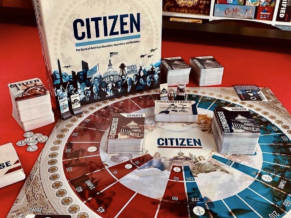By Gray Smith and Steve Barger, Co-designers of the CITIZEN board game
Historians credit Lotte Scharfman, a refugee who escaped with her family from Austria during World War II, with coining the phrase “Democracy is not a spectator sport.”
We respectfully include this addendum: “It’s also not a solo act.”
We know that democracy is a dynamic machine with many moving parts. Therefore, active means are called for when teaching understanding of these pieces and how they interact within our country’s law-making ecosystem. In simpler terms, we learn better by doing.
The spark for CITIZEN was ignited more than a dozen years ago, after memes popped up across the post-Citizens United internet that depicted members of Congress in NASCAR-style uniforms covered with “sponsor” logos of their largest corporate campaign contributors.
The first iteration of CITIZEN was a set of static baseball-style cards that included each member’s voting stats, legislative history, seniority, and funding sources. Deemed interesting but not engaging, we scrapped the static card idea in favor of something that moves.
What emerged seven prototypes, hundreds of test plays, and a decade later was a constitution and fact-based, non-partisan, icon-driven simulation that looks like this:
The issues, events, and people that make up CITIZEN arranged themselves organically into a “scientific-notation” style grid, ranging from the more general partisanship to equal numbers of pro and con positions on specific influential issues and industries. An intuitive iconography drives play interaction.
Upon this grid hang the various interactive components of the legislative ecosystem, expressed as multiple categories of cards, each representing a different genre of influence:
These multiple card categories consist of Issues advanced by players (Cause cards), Events that impact all players (Circumstance cards), and the focal point - the leverage of the Electorate (Citizen cards). In place of dice, CITIZEN features a card for each of the 535 members of the sitting Congress. Voting history, seniority, and campaign finance direct Congressional votes. (Note: we have been unable to find any other platform that instructs or demonstrates the factual impact of campaign finance on legislative outcomes.)
Cause card examples:
Circumstance card examples:
Citizen card examples:
Congress card examples:
How to use CITIZEN
Some educators, including the social studies chair from a state department of education, and another social studies chair from one of our largest school systems, have offered in-depth guidance. For example, they’ve both suggested that educators can create numerous lesson plans using CITIZEN’s different card categories to inspire primary source research and class engagement in a variety of ways (described in detail here: https://www.citizenthegame.com/educators). An analysis of CITIZEN’s alignment with NCSS and EAD themes is also available at this link.
After first exploring each category, students better appreciate the dynamics that are created when the components are integrated for play.
Outcomes
One of CITIZEN’s most compelling case studies occurred when we accepted an invitation from the Bill of Rights Institute several summers ago to present CITIZEN to the high school participants in their Constitutional Academy program.
After a brief learning curve, the players discovered each turn involves making several decisions – to advance their Cause or block another’s, to use prescribed methods of conduct, or assume the risks associated with more manipulative real-world choices, strategies for the accumulation and deployment of power, and the creation of alliances of common interest with other players. Multi-level decision making and engagement with other players are features that set CITIZEN apart in the educational gaming sphere.
Game play immersed the students in decision-making. In addition to the factual contents of the game cards, they discovered that in challenging conversations, opposition and conflict can have different meanings, with conflict being a disagreement sometimes presented as a personal attack on values, and opposition being an objective difference of opinion that leads to more intelligent decisions. Others’ opposing ideas help players see multiple sides of an issue.
Some students also realized that when one spends too much energy blocking an opponent during gameplay, advancing one’s own Cause slows to a halt. The BRI players became engaged with CITIZEN to the point that the chaperones ended play to honor curfew rules.
The outcomes of engagement with CITIZEN extend far beyond rote knowledge. CITIZEN inspires discussion and offers unique, multiple perspective insights into the workings of our dynamic legislative ecosystem, how political power is built and deployed, the discovery associated with the juxtaposition of people and events from across our history with today’s front page issues. CITIZEN doesn’t just teach legislative politics. It also demonstrates the multi-dimensional impact of players’ decisions and allows them to see themselves as change agents.
The most important reason why CITIZEN exists in its analog format: students engage not merely with the game, but also with each other.
The downloadable rule book at the link posted at the beginning of this article describes ways to use CITIZEN as the basis for classroom, extra-curricular, club, and competitive student engagement.
A final note: We took much care to avoid the presence and appearance of any partisan agenda. To stay current and reflect the people and events of each Congressional term, a new edition of CITIZEN will be available every two years following each federal election. It is our hope that educators and students form a dynamic learning community that will inform Citizen card content for future editions.

